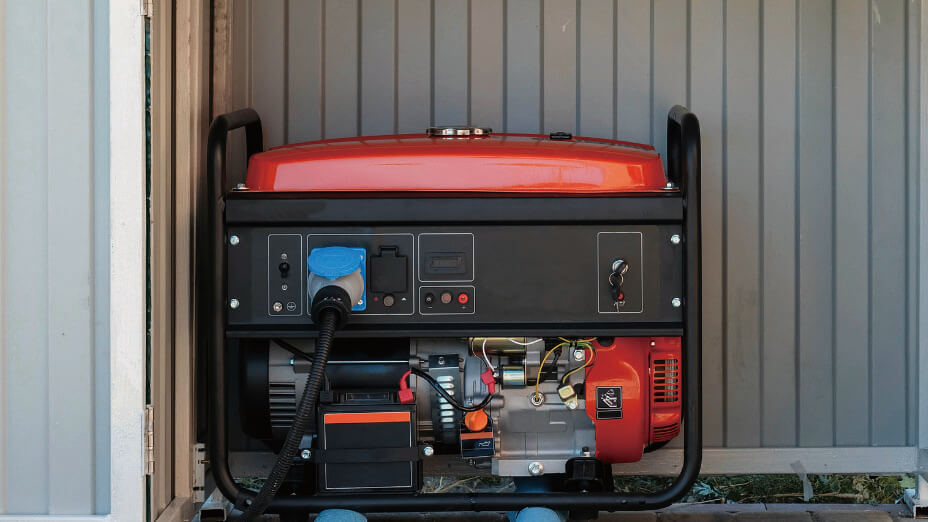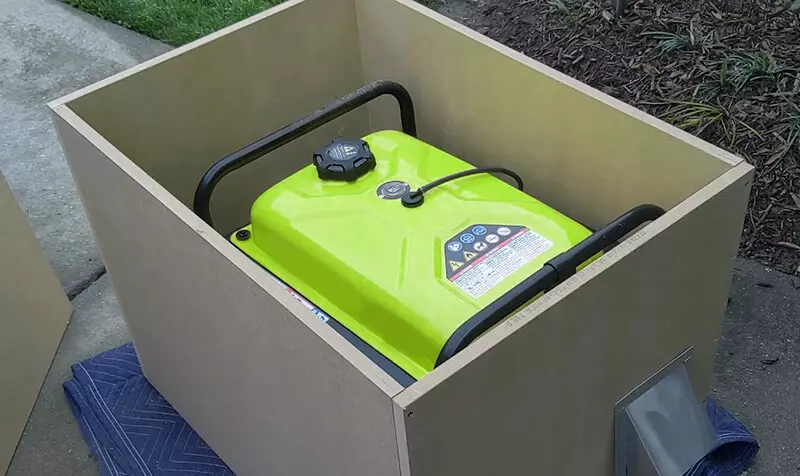21Dec 2022
table of contents

Generators are always helpful for camping and home use, but how do you get rid of the constant hum of a generator? Fortunately, there are many different solutions to this common problem BISON generator manufacturers offer, ranging from quick hacks to long-term fixes. Read on for our comprehensive guide to quieting your generator so you can use it whenever you want without being disturbed by the noise! First, let's look at what makes a generator so loud.
Dynamos are loud because at the most basic level, they are engines. All motorized equipment emits noise as a by-product of generating energy, and generators are no exception. A generator has an internal combustion engine and moving parts, all of which produce sound.
Typically, a generator uses a gasoline engine to convert mechanical energy into electrical energy. Modern works on the principle of electromagnetic induction, which can be used to directly supply power or to charge batteries.
When looking at generator noise sources, the two most important are the engine and exhaust.
engine
The engine is the source of mechanical energy for the generator. It uses a fuel such as gasoline to power a piston connected to an generator. We don't need to get into the intricacies of how a generator engine works, though.
What is important to us is the type of sound the generator engine produces. This is an impact sound because the waste energy of the generator is kinetic energy (vibration). These vibrations are transmitted through the generator to the surrounding structure and through its feet to the floor.
exhaust
The exhaust of the generator is mainly used to discharge exhaust gas, but it also has the function of sound. These sounds come from the high-pressure gas inside the engine. When it escapes through the exhaust, it sounds like a pop or sputter.
When the engine is banging, the exhaust of the generator produces an airborne sound.
Here is the recommended way to use BISON manufacturers:
The overall decibel level of a generator depends on many factors, but you can expect it to be somewhere between 60dB and 100dB. One thing to keep in mind before buying a generator is to know your power needs. If you know what your electrical needs are before you buy one, you can probably avoid the generator noise situation entirely.
this is very simple. The more power the generator puts out, the louder it will be. You should weigh how much power you need, how much noise you can tolerate, and how much you are willing to spend on a generator.
If you just want to power something so small, then you can use a smaller, less powerful generator. Smaller tasks can be handled by generators that produce a few hundred watts.
If you want to power a larger appliance like a refrigerator, microwave, or A/C unit, you'll need a generator with a higher power output. Generators with an output of 2,000 – 5,000 watts can drive larger appliances.
Of course, some generators are specially designed to output more power while being quieter than others, such as super silent inverter generators, diesel silent generators. These generators are usually more expensive because they offer the best of both worlds.

The first thing to keep in mind when using a generator is the location of the generator itself. Especially the exhaust end of the generator. You should always keep this side of the generator away from your residence.
With some generator models, it is also possible to point the exhaust pipe upwards towards the sky.
Either of these positions will direct the noise directly from the exhaust away from you. It's not the best solution for silencing the generator, though, as it doesn't actively use any noise-canceling technology.
BISON only recommend this solution if you're in a hurry and don't have noise-canceling material on hand.
Another easy solution is to move the generator away from your house. Technically speaking, sound intensity is inversely proportional to the square of the distance from the sound source. In short, the farther you are, the quieter you are.
So keep your generator away from your home or RV. Of course, there are some limitations to this advice, such as the size of your backyard or campsite.
Also, you may want to purchase a generator extension cord so you can keep using it.
As with the tip above, it's worth considering the neighbors who use this solution. After all, it's not fair to let your noise pollute other people's problems.
Another important factor to consider when determining how to silence a generator is the surface it will be placed on while it is running. Once you find the correct distance to place your generator, you need to make sure you place it on a surface that will dampen the noise rather than amplify it.
Best to avoid all hard surfaces. So don't place your generator on concrete, wood or asphalt as these surfaces will only increase the noise.
Often, if you're camping, the best and only option to turn on your generator is dirt or grass. These are great solutions for placing generators. Both of these will absorb and dampen the sound produced by rumbling generators.
Let's say you are in a situation where there is no softer ground to mount your generator on. Anti-vibration pads are a great solution. Anti-vibration pads are usually made of rubber and help dampen vibration and noise from home appliances.
You can place one of these pads under the generator and it will help dampen noise caused by vibrations. BISON generator manufacturers also consider minimizing noise. When producing generators, rubber feet are installed on the generators to help absorb vibration and reduce noise disturbance.

Now that you've placed your generator on a soft surface away from the house, the next best thing you can do to further silence it is to use a sound deflector. The purpose is to reflect and/or dampen sound waves so you don't hear them in your home.
While this sounds technical, it's actually quite simple to execute.
The only things you need are 4 sheets of plywood and a sheet of non-combustible material. Drywall is a great material because it is relatively fire resistant. Each piece should be approximately 4 feet wide and 3 feet high.
You can support each component on the generator at a specific angle. Make sure to use a piece of drywall on the exhaust side of the generator. You don't want the deflector to catch fire!
By placing the blocks at an angle around the generator, you allow room for the airflow while deflecting the sound waves towards the ground. You can instantly reduce the decibels emitted by your generator without affecting performance in a negative way.
Another idea similar to creating a deflector is to build an acoustic enclosure or soundproof box.
This solution works for the same reason deflectors work. The enclosure will contain the sound waves and greatly reduce the decibel noise of the generator. It is also one of the most efficient solutions currently available.
The best part about the sound enclosure or sound box is that it is much more compact than 5 plywood panels in a trailer or RV. Another great thing is that you can buy a baffle box or make your own.

If you decide to build your own baffle box, it's a fairly simple process. To build a baffle box, you only need a few things:
Wooden 2×4's
L-shaped bracket
Quiet panel
Foam sealant
If you plan to use a homemade soundproof box, remember that you will need to include ventilation holes, both exhaust and intake.
This is very important because the heat can damage the generator if there is no significant airflow in the baffle box enclosure. Cut holes in the side of the box where the generator exhaust goes.
One of the most popular strategies people use to quiet their generators is to install a larger replacement muffler. The job of the muffler is, you guessed it, to muffle the sound coming from the exhaust pipe connected to the generator motor.
Inside the muffler are perforated pipes designed to deflect sound waves from the engine in order to reduce the noise that ends up exiting the exhaust pipe.
The exhaust pipe is one of the noisiest parts on a generator, second only to the engine itself. By improving the quality of the quiet muffler, you can expect to reduce generator noise by around 10-12 decibels.
If installing a replacement muffler sounds like too much trouble, you can try water instead. This is a quick fix that can reduce the noise level, but I wouldn't recommend it for long term. After all, water and electricity aren't the best of friends. You still need to do some customization for this.
For this, all you need is a 5 gallon bucket of water, a hose, and the clamps to secure the hose to the exhaust pipe. Make sure to place the generator higher than the bucket.
You don't want water flowing back into the exhaust of the generator. You can also poke a few small holes in the hose if you want to be extra careful not to let the water back up.
Setup is fairly simple. Use the clamps to attach the hose to the exhaust pipe. Then place the other end of the hose into the bucket. The water will act as a silencer for generator exhaust noise.
By using this water muffler method, you can expect to reduce generator noise by about 5-7 decibels.
Some final tips
Making your generator quieter can be as simple or as complex as you want. Whichever method you choose, consider these final tips to ensure your options are as effective as possible
Soundproofing is blocking openings, but don't take it literally. A generator needs good airflow, and the last thing you want is a fire because you think it's too loud.
You can never really soundproof your generator, so you have to be smart about reducing it. For example, if you plan to use your generator while camping, don't install it so far from the campsite that it disturbs others.
Make sure your generator isn't making a lot of noise from going bad. Fix it before trying to make it quieter, as you might mask the problem.
Generators are undeniably handy, and you'll be glad to have one when you run out of power.
Living and sleeping with constant noise can be very unpleasant, so do everything possible to reduce it.
You want to avoid annoying humming as much as possible so you can relax and enjoy the power without being constantly irritated by loud noises.
While the above tips can help reduce noise to some extent, they won't completely eliminate all noise. For what it's worth, a solid, well-constructed multi-ply box and acoustic caulk will do wonders.
This is a wholesale project you won't regret.
inquiry form here
BISON BLOG, All the latest news and views from Bison Machinery.